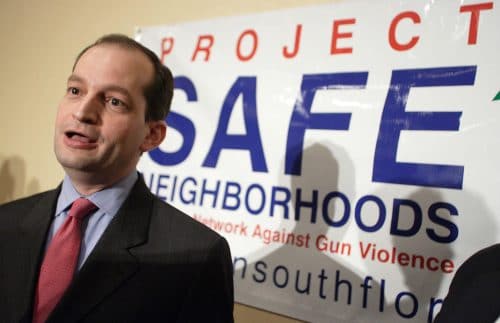After Reading Epstein’s Victims’ Account, How Does Labor Secretary Acosta Sleep at Night?
COMMENTARY

Stephen King himself would be challenged to invent a fictional villain as monstrous as Jeffrey Epstein, but Epstein is real.
And, despite mountainous evidence of stomach-churning crimes, today he is free as a bird — thanks to the man who now sits as the U.S. Secretary of Labor.
It’s well-documented that Alexander Acosta, then the U.S. attorney in Miami, approved a slap-on-the-wrist plea deal for Epstein, a rich hedge fund manager who recruited scores of underage girls to perform sex acts at his Palm Beach mansion and his homes in New York, New Mexico and the U.S. Virgin Islands.
But the recent Miami Herald series by reporter Julie Brown exposes in startling detail not only Epstein’s voracious methods, but the suspicious cooperation between federal prosecutors and Epstein’s lawyers in plotting the 2008 agreement that would keep the shameful terms secret from the media — and from Epstein’s young victims — until the deal was done.
In a September 2007 email to Jay Lefkowitz, one of Epstein’s attorneys, lead prosecutor A. Maria Villafana wrote: “On an ‘avoid the press’ note, I can file the charge in district court in Miami, which will hopefully cut the press coverage significantly. Do you want to check that out?”
That, folks, was a U.S. prosecutor offering to move a sex crimes case out of Palm Beach County to spare a wealthy, politically connected defendant the humiliation of local media scrutiny. The switch didn’t happen, but it’s the thought that counts.
Epstein, who was also suspected of trafficking in minors overseas, assembled a blue-ribbon defense team that included his friend Alan Dershowitz, Lefkowitz, Roy Black and Ken Starr, who led the investigation of Bill Clinton’s affair with Monica Lewinsky.
Acosta would later write that his own group of prosecutors faced “a year-long assault” by an “army of legal superstars.” It’s a pitiful excuse for going easy on a serial child molester.
By the time Epstein walked into state court on June 30, 2008, the FBI had identified 36 underage victims, some as young as 14 at the time of the crime. None was brought in for the sentencing hearing, and most learned about it later from news reports.
Epstein left the courtroom with a deal that would make any predator turn cartwheels. He pleaded guilty to two prostitution-related counts, and would serve only 13 months in a county jail instead of state prison.
Equally mind-blowing was the “non-prosecution agreement” approved by Acosta that shielded Epstein and four accomplices from any federal charges. At the time, the FBI was gathering evidence for a 53-page indictment that could have sent Epstein to prison for life.
Another bizarre part of the plea deal gave immunity “to any potential co-conspirators.”
Epstein had lots of famous friends — celebrities, politicians and royalty.
Prince Andrew hung out with him. So did former president Clinton, who rode many times on Epstein’s jet. Another Palm Beach pal was the current commander-in-chief, Donald Trump, who in a 2002 interview called Epstein “a terrific guy” who liked beautiful women “on the younger side.”
One of Epstein’s victims said she had sex with Prince Andrew when she was 17. He denied it. Neither Clinton nor Trump has been accused of participating in Epstein’s infamous massage parties, but one can understand why prosecutors might view the case as sensitive.
The deal, however, was indefensible. The outcome was a sick joke.
Epstein was housed in a separate wing of the Palm Beach County jail. Despite being a convicted sex offender, he was put on “work release” and allowed to go to his office up to 12 hours daily.
After his term was done, he traveled extensively and even got permission to visit his private Caribbean island — an uncommon privilege for a felon on probation.
Last year, after Trump nominated Acosta for Labor secretary, the ex-prosecutor was asked about the Epstein case during his confirmation hearings. He said he didn’t know that Epstein would receive such coddling while incarcerated.
Acosta also offered a tepid defense of the soft plea agreement, saying basically that any deal that forces such a person to go to jail, register as a sex offender and pay restitution to his victims “is a good thing.”
The victims, several of whom have spoken out, would not agree. The Herald identified about 80 women who said they were exploited or abused by Epstein. About 60 of them were located, and eight agreed to be interviewed.
The notion that veteran federal prosecutors were simply outfoxed and outgunned by Epstein’s team of defense lawyers defies belief. There’s got to be an unsavory inside story as to why this ludicrous deal went down the way it did.
Acosta, who otherwise had a solid reputation as U.S. attorney, clearly hasn’t revealed all he knows about what happened. But how, after reading the first-hand stories of the victims, does he sleep at night?
We know how Jeffrey Epstein sleeps — with a monster’s grin on his face.
—
Carl Hiaasen is a columnist for the Miami Herald. Readers may write to him at: 1 Herald Plaza, Miami, Fla., 33132.
—
© 2018, The Miami Herald Distributed by Tribune Content Agency, LLC.
























